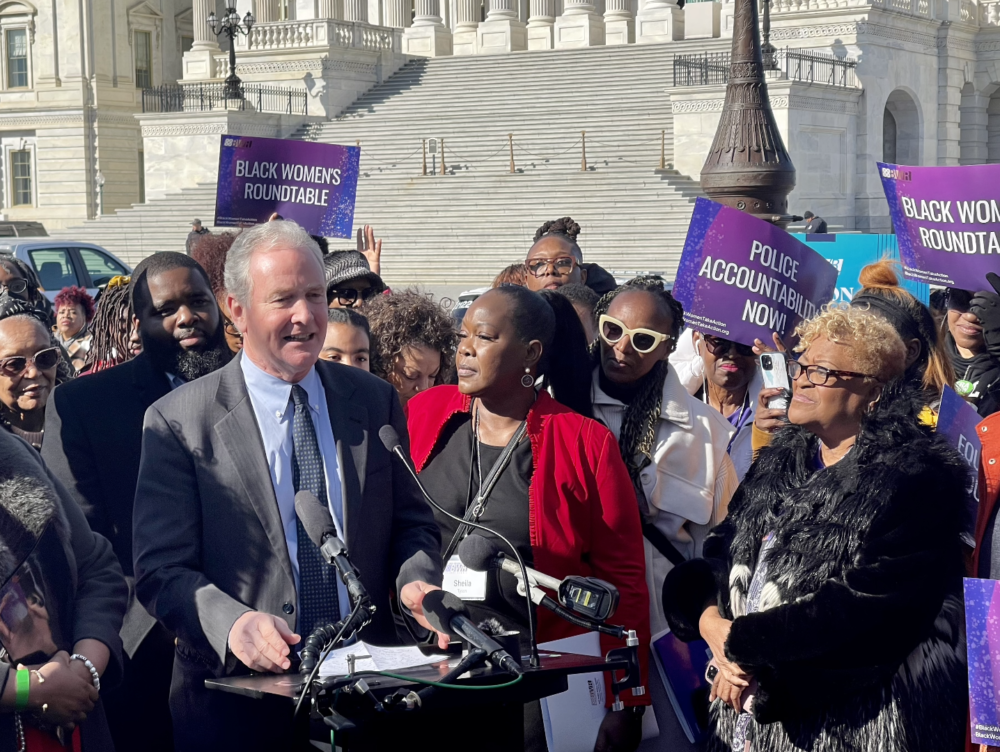WASHINGTON – Sen. Chris Van Hollen, D-Maryland, on Thursday urged congressional action to protect voting rights and commended the participation of Black women in politics as he welcomed dozens of activists from the Black Women’s Roundtable to Capitol Hill.
Members of the Black Women’s Roundtable, an empowerment program that works to mobilize Black participation in American democracy, gathered in Washington to advocate for criminal justice reform, voting rights protections and a slew of other national issues.
“Black women have been at the forefront of the fight for justice and liberty since the earliest days of our country,” Van Hollen said at a press conference outside the United States Capitol. “When it comes to casting your votes and calling for change, you are the ones who have moved our country forward.”
Van Hollen called on Congress to pass the John Lewis Voting Rights Act, which would identify states with a history of voting discrimination and require them to obtain permission before changing their voting procedures.
So far this year, state legislatures have introduced 150 restrictive voting bills and 27 election interference bills, according to the Brennan Center for Justice at the New York University Law School. Since 2020, dozens of states have enacted laws that make it harder for voters of color to cast their ballots.
“Every citizen should be able to have access to the ballot box without having to jump over a lot of hoops or standing in long, long lines specifically designed to get people to get tired of voting,” Van Hollen said.
Advocates from the group also called on Congress to take action on criminal justice reform.
Through her work as CEO of the Clean Slate Initiative, Sheena Meade has spent her time advocating for so-called “clean slate” laws, which can seal arrest records for people convicted of low-level, nonviolent drug offenses who complete their sentences. Nationwide, Black people comprise 62 percent of drug offenders admitted to state prisons, according to Human Rights Watch.
During the press conference, Meade asked activists to raise their hands if they had a friend or family member in jail or with a criminal record. A flurry of hands shot up in the crowd at the press conference.
“We’re about civic engagement, bringing people to the table, bringing people to the voting booth. But what happens when they’re shut out? How do we ask them to show up for our community when they can’t?” Meade said.
Roughly 4.6 million Americans cannot vote because of felony disenfranchisement convictions, according to The Sentencing Project. One in 19 Black Americans is excluded from voting in some way.
Advocates emphasized how criminal justice issues facing Black people across America connect to injustices associated with over-policing in Black communities.
Criminal justice reform is of paramount importance to the lives of Black Americans, said Melanie Campbell, the president of the National Coalition on Black Civic Participation and convener of the Black Women’s Roundtable.
“We have been brutalized by the criminal justice system. We have been the victims of poor policing. We’ve been victims of aggressive policing,” Campbell said.
After Minneapolis police murdered George Floyd in 2020, advocates hoped Congress would take swift action to improve the nation’s policing. But the George Floyd Justice in Policing Act – a law that aimed to prevent and remedy racial profiling by law enforcement across the country – stalled in 2021.
While acknowledging the progress made in Congress on other issues facing Black Americans, Van Hollen agreed with advocates that lawmakers must prioritize passage of the George Floyd Justice in Policing Act.
“We need to make sure that we have criminal justice reform and end the national scandal of mass incarceration in the United States of America and have constitutional policing,” Van Hollen said. “We have a lot of work to do.”

